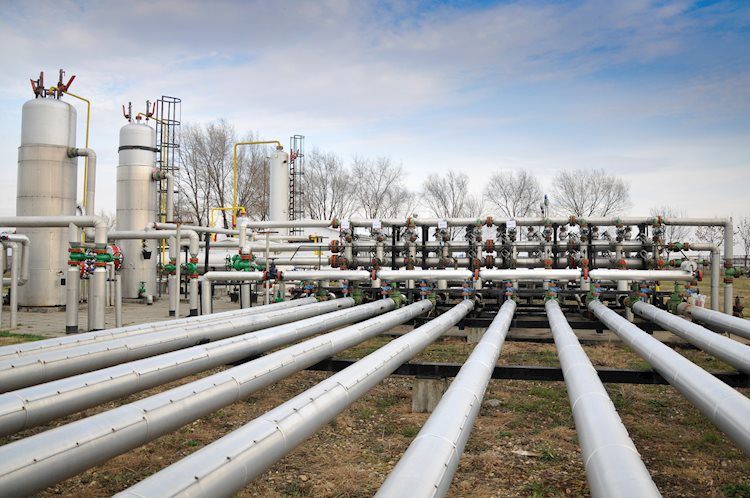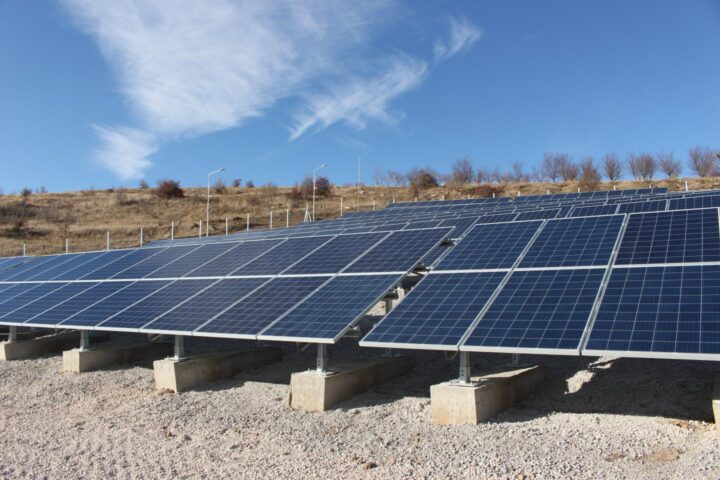Japan’s Mitsui said the world lacks enough LNG for energy transition.
Announced natural gas projects in the world still won’t make up for the supply needed when considering the energy transition that will take several decades.
Worldwide LNG demand is forecast to increase by 3.4% annually over 2022-2026 to reach 444 million metric tons, according to BloombergNEF.
A natural gas boom is expected as energy demand skyrockets.
Global energy consumption is set to surge through to 2050, outpacing efficiency gains, according to the US Energy Information Administration’s latest report.
The biggest fossil fuel players, including Shell and Chevron, are clarifying that transitioning to a green future will require much more natural gas and plan to accelerate investments.
But, Europe is still reluctant to enter new long-term LNG supply contracts.
This is increasing its exposure to the volatility of the global spot market, while Asia is pursuing a different strategy.
ICIS said the share of flexible LNG in Europe’s gas supply mix is set to increase to more than 70% by 2030 if expiring long-term contracts are not renewed and no new contracts are signed.
As a result, fear grips the gas market, facing winter supply threats.
Mounting threats to gas supply are sending most global fuel prices higher as fear takes hold of the market just ahead of the first signs of winter.
Israel has suspended production at the Tamar offshore gas field off its southern coast and will seek alternative fuel sources to meet its needs.
That means fewer gas exports to Jordan and Egypt, which import 7% and 4% of their total gas supply from Tamar, respectively, exacerbating their energy problems and impacting Egypt’s LNG exports.
But Leviathan continues to operate normally.
Lebanon’s first offshore well in block 9 by TotalEnergies has proven a failure in a blow to the country’s dream of joining the East Mediterranean gas bonanza.
Europe
The EU inflation rate eased to 6.40%, compared to 7.10% last month and 9.60% last year.
GDP is still growing but down to 0.8% in 2023.
EU industrial output is down by more than 5% y-o-y.
EU countries agreed to overhaul Europe’s power market after Germany and France broke a deadlock on how to treat nuclear power that had been holding back progress for months.
In effect, Germany caved into French demands regarding its nuclear power plans.
This allows EU member states to have room to manoeuvre and take action based on their own energy mix.
These reforms are intended to provide better investment signals to renewable power developers and secure electricity supply to prevent any spikes in prices – it is crucial to lower prices to keep European industry competitive.
The agreement will become law following negotiations with the European Parliament.
The CEO of Vitol, the world’s largest independent oil trading company, said his biggest surprise of the European energy crisis is the “massive” magnitude of the gas demand destruction that is still ongoing.
“It’s not renewables… the industrial gas demand picture in Europe remains terrible,” said Russel Hardy.
European natural gas benchmark Dutch TTF’s price soared 41% to an eight-month high of €56 per megawatt-hour last week, and it has gone up more than 50% in a month.
Even though the Israel-Hamas war has an impact, it is limited.
More worrying is that workers at Chevron’s LNG facilities in Australia reaffirmed their plans to resume strikes this week while labour talks continue.
According to the Copernicus Climate Change, there is also a high probability that Europe will have a mild winter, potentially reducing the demand for heating fuels, considering the EU’s storage is 97.5%.
EU gas prices increased by more than 20% on last week’s barrage of harrowing headlines, even though consumption is unchanged, and fundamentals remain weak.
The mismatch between European gas demand and prices is completely irrational and understandable, given Europe’s tight gas supplies.
But as sabotage is suspected of being behind the Finland-Estonia Baltic connector pipeline leak, concerns have been raised over the vulnerability of European pipeline infrastructure – a Baltic Sea telecom cable connecting Sweden with Estonia has been damaged at roughly the same time.
Even though the EU is not likely to have any substantial supply difficulties this winter, the ongoing impact of global gas disruption will keep the prices high – a cost that households and businesses will have to shoulder eventually.
Norway will drop the word “Petroleum” from the name of its Ministry of Energy in 2024.
But, of course, it will continue pumping lots of oil and gas.
EU imports of natural gas dropped significantly in the second quarter of 2023, by 17% in terms of net mass, compared with the same quarter in 2022.
Dr Charles Ellinas is Senior Fellow at the Global Energy Center, Atlantic Council
X: @CharlesEllinas










